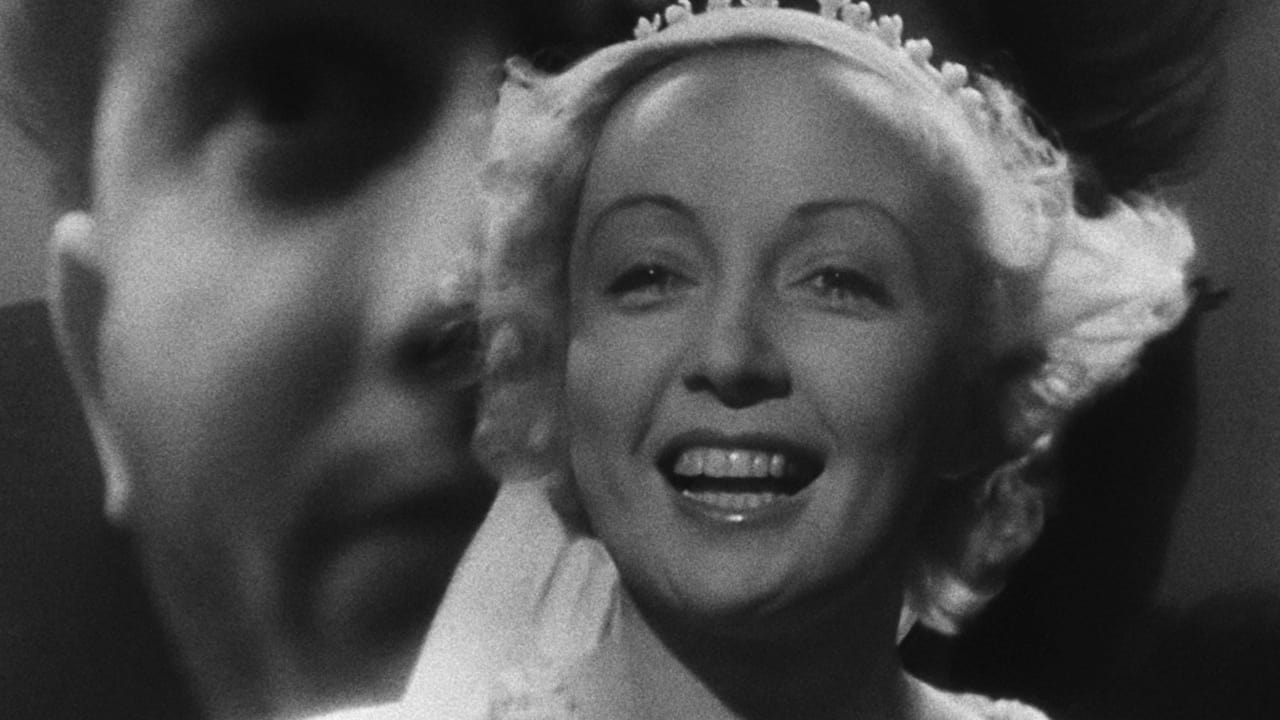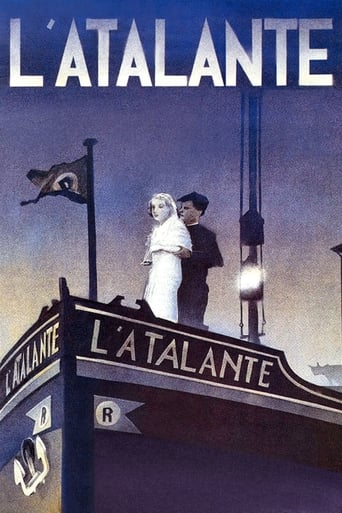Sexylocher
Masterful Movie
AshUnow
This is a small, humorous movie in some ways, but it has a huge heart. What a nice experience.
Orla Zuniga
It is interesting even when nothing much happens, which is for most of its 3-hour running time. Read full review
Janae Milner
Easily the biggest piece of Right wing non sense propaganda I ever saw.
elvircorhodzic
In life nothing is easy. Even if you think that you are happy and in love. Before someone to love, it would be good to understand life with the person you love. Compared two lovers nothing is simple. Little problems must be worked out. What a love story. Jean Vigo offered us a story about people. The story about us. L'ATALANTE is somewhat unusual and confusing movie. In life nothing is easy. People are confused and different. In addition, they are able to love and to hate. The second feeling we ignore and commit to the film. L'Atalante is a film that everyone should see, but this movie is not for everyone. Maybe that's why I call it a jewel of cinema. Vigo challenged life and human relationships. The story seems simple. The main characters always act in a different way, but aspire to the same goal.Juliette is played by Dita Parlo. Positive and playful girl from the countryside. Ready to give love and attention to all that surrounds her. She wants to see Paris. She wants to feel Paris. Dita Parlo is mesmerizing. Jean Daste (Jean) is apparently determined and hard-working young guy. He's in love with his wife, but he has a lot to learn about the relationship between two people. Jealousy is not welcome if it violates nice person. He worries about his work.Michel Simon as Pere Jules in the film looks much older than it really is. I would say that the character is heart of the story. Inspired by the love of two young people. He understands them and lets them learn the lesson of life. One physical unforgettable character who has an interesting touch of humor.I think this movie's poetry of human relations.
Bifrost_NOR
Jean Vigo had a short career, he made only 3 short films and one feature before he died of tuberculosis just a few months after finishing L'atalante.Jean Vigo got a great sense of humor throughout all of his films, this one is no different. it falls under the category Romance/Drama but i would add Comedy too.Jean Vigo's short films were all revolutionary for their own reasons, but instead of trying to revolutionize more i feel you aimed for quality. of cource it is also revolutionary since it is a very different love story, i am going to come back to that later.The film is a bit outdated (which is to be expected from a film from '34) for me that has nothing to say, but some people might feel that takes away some of the enjoyment, which is why i mentioned it.It's about a marriage who get's torn apart by nothing, by minor differences in personality. The newly married couple finds out that they are not able to live whit each other, but after being separated a couple of days they find out that they are not able to live without each other either.Jean is a serious, good, but boring man, throughout the film we see that Juliette finds the more special men more attractive even if being special is either a positive or negative thing.There is great imagery all the way through and the story is really original, no wonder it is frequently mentioned on top 10 best movies list Etc.9/10 Fantastic
bts1984
As I am writing this review in 2014, this movie celebrates its 80th anniversary. Some years ago it was considered the greatest movie ever. It's a pretty good movie indeed, but claiming it as the best ever is a perfect nonsense. As the movie is celebrating its 80th anniversary, the critics seem to be a little more reasonable, considering it now the 12th greatest movie ever. Claiming it as the 12th greatest ever is a nonsense too, but better that than claiming it as the greatest of all.That said, this is a movie with significant historical and sentimental value. It was the first and last full-length film directed by the promising young director Jean Vigo, who was taken away from us too soon. Jean Vigo only directed two documentary movies ("À propos de Nice" and "Taris, roi de l'eau") and one controversial featurette ("Zéro de conduite"). "L'Atalante" would be his first and only full-length motion picture. He always had a fragile health but his illness worsened considerably when he directed "L'Atalante" and that finished him off. Although he knew he was going to die soon, he still wanted to make the movie until the end. You can say that he gave his life to make this movie. Despite his short movie career he left his mark and later influenced french directors such as François Truffaut and the French New Wave."L'Atalante" was also released under the interesting alternative title «Le chaland qui passe». It's as simple and basic as a movie can be. Even though it takes place mostly inside a crude river barge, it also has nice sights of some french village in the beginning and later some lovely sights of the gorgeous city of Paris. And a good thing they did that, because if the whole thing was inside an ugly cargo ship, it would have been boring.Generally speaking, the characters are nothing too special, despite the good performances by the respective actors.Jean Dasté is Jean, whom I have a divisive opinion about. On one hand he is quite funny at times, but on the other hand he shows he is impulsive and bossy. To be honest, sometimes he really is a douche, especially towards the cats and his wife.Dita Parlo is Juliette (Jean's wife). She isn't particularly charming and not really hot in nature, but she is usually a decent woman and fine-looking rather than a "fatal attraction".Michel Simon is Père Jules, an eccentric old sailorman. While his moral nature is questionable (well, you wouldn't expect anything but lack of politeness from a sailorman), he is a fun and entertaining character. Louis Lefebvre is the cabin boy with a bizarre voice. Not much of a character, although there are some funny scenes with him.Gilles Margaritis is the street peddler. He is the funniest character of the film. I know that he wasn't supposed to have much of a role, but still it's a shame that his role wasn't bigger. Plus, in a way I think that Juliette should have ended up with him instead of going back to Jean.The soundtrack is nice, especially the Main Theme and the music that is played in the nightclub where Jean and Juliette meet the street peddler.The french of this movie can be really difficult to understand. Extra-attention is required to understand it as much as possible, because the language is often spoken very quickly. That characteristic is particularly notorious on Michel Simon, although part of the reason could be his nationality (he was swiss, and the swiss french has its peculiarities).In theory that is not so bad if you've got subtitles, but if you don't... on the other hand, even with subtitles, for people who want to understand, feel and learn the french, it can be quite hard to understand the thunder-paced french in this movie.Title in Portugal: 'O Atalante'.
Jackson Booth-Millard
I didn't realise that director Jean Vigo only made four films before dying at a young age, this film and Zero for Conduct are the two that appeared in the book 1001 Movies You Must See Before You Die, so naturally I had to watch. Basically the L'Atalante is a canal barge, and the captain Jean (Jean Dasté) has married Juliette (Dita Parlo), despite not meeting much, and after a march they start their trip together. They are travelling between Le Havre and Paris on the barge with a cargo delivery, while on honeymoon, and there are tensions between the hardly used crew members. But the bigger conflict with tempers flaring and things smashed comes when Jean is jealous of Juliette having an affair with first mate and obsessive cat lover Père Jules (Michel Simon). Another argument and scuffle comes while in Paris and a Peddler (Gilles Margaritis) who wants to run off with Jean's wife, but having become tired of barge life she runs off anyway. Jean starts suffering near-catatonic depression having furiously left Juliette behind after casting off, and he tries a few things to try and get over it, but they do not work. Juliette meanwhile has found nothing but despair and crime since going onto the mainland, and it is only after Jean tries to kill himself jumping into the river that they are both reunited, and in the end they are happy once again together. I will be absolutely honest, and say that this explanation for what happens in the film is not something I would have recalled myself. Also starring Louis Lefebvre as Cabin Boy, Fanny Clar as Juliette's Mother, Raphaël Diligent as Raspoutine, Juliette's Father and René Blech as Best Man. I did not understand everything that was going on to be honest, but the relationship between the main characters was good, the realistic documentary style material for life on the barge is alright, and I can see that it did start influence the French New Wave of cinema, from what I did understand it is a most watchable romantic drama. Very good!

